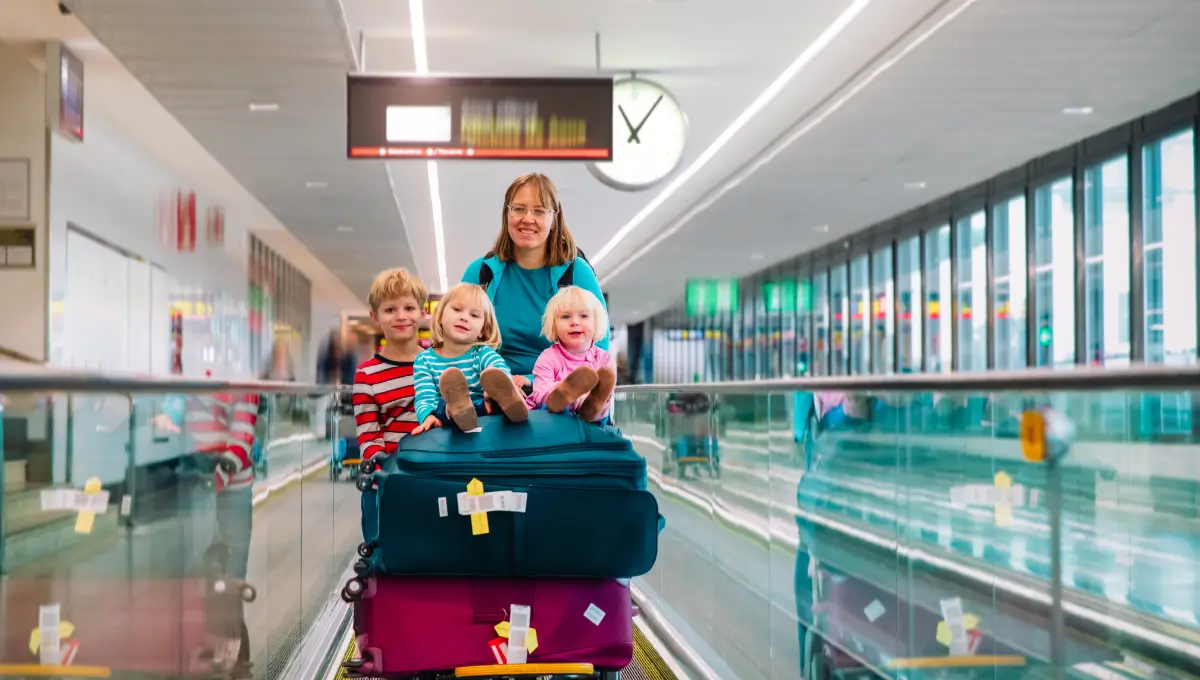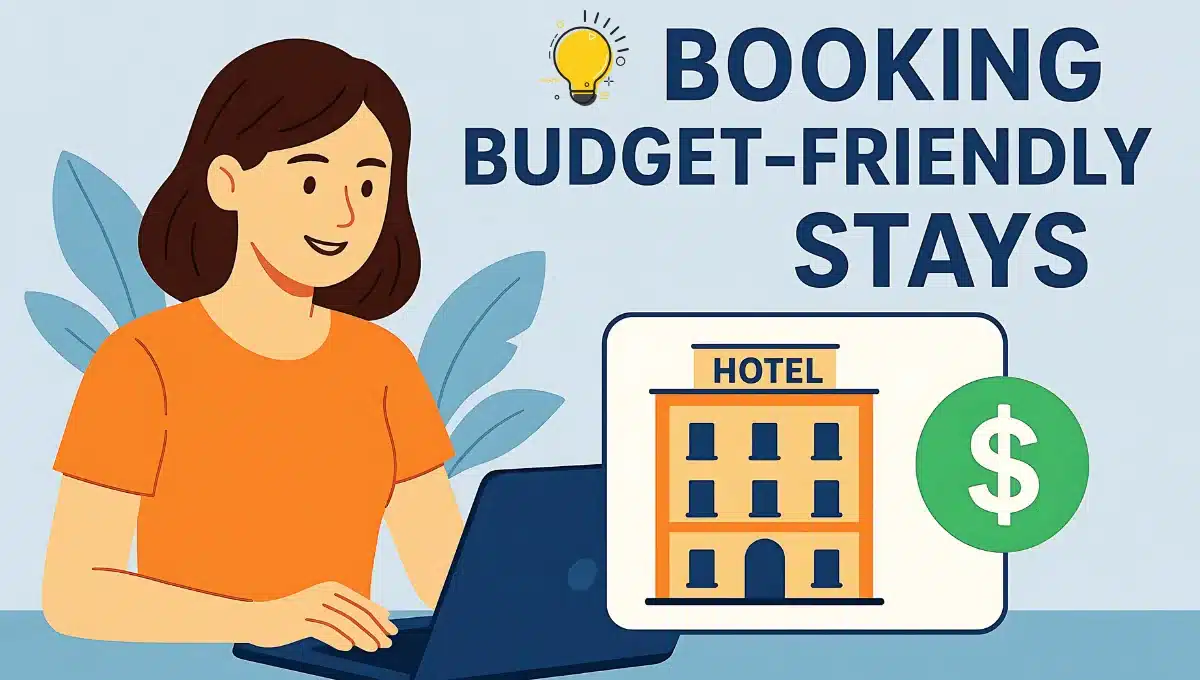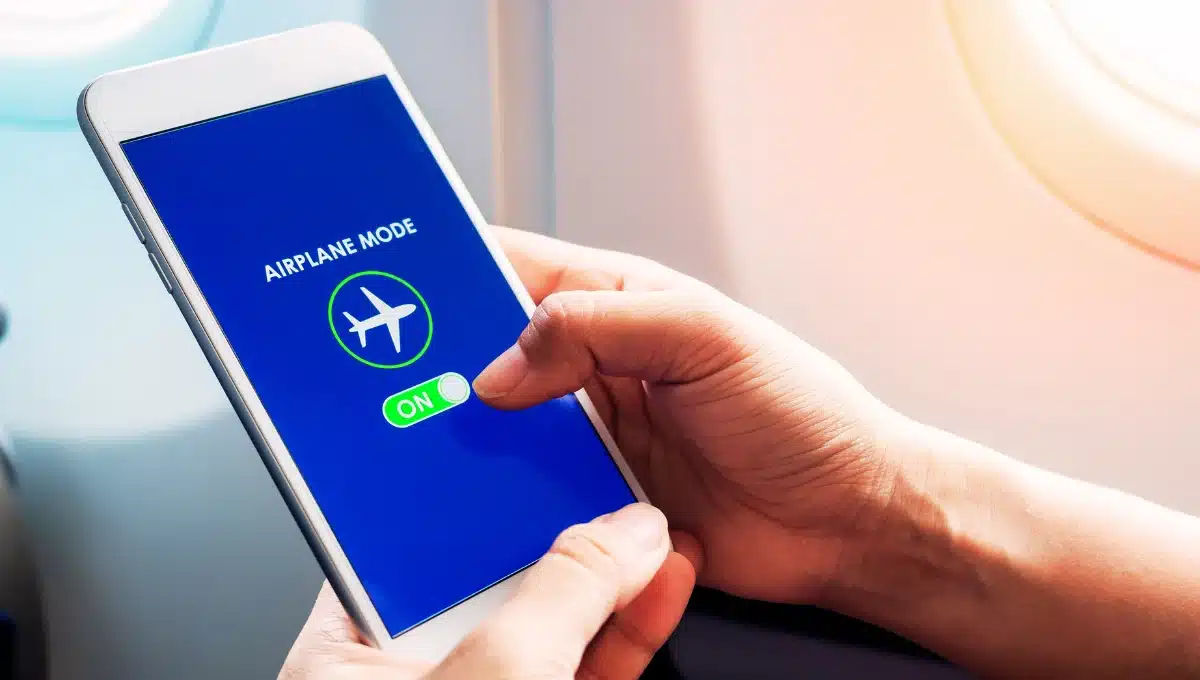How can I keep my kids entertained during a long flight? Bring a selection of games, puzzles, coloring books, and electronic devices with movies or entertainment. Play interactive games or storytelling. During the stops, let them stretch and walk around. Pick airlines that provide kids’ in-flight entertainment.
Traveling with kids can be super fun—full of laughter, adventure, and amazing memories! 🏖️
But let’s be real, it can also be tricky, especially when exploring new places with little ones.
The secret to a smooth trip? Being prepared! The good news is there are easy ways to save time, money, and avoid stress while traveling as a family.
Don’t worry—we’ve got your back! This guide has the best tips to help make your family vacation fun, easy, and totally stress-free! 🎒✨
- 📝 List of 11 Best Tips For Traveling With Kids
- 1. Avoid overpacking
- 2. Make all the reservations you can
- 3. Outline the Trip for Your Kids
- 4. Food and drink at all times
- 5. Spend More on Quality Gear
- 6. Keep Track of Your Child
- 7. Travel With Basic Medicines
- 8. Special Needs in Local Languages
- 9. Identification Documentation
- 10. Bring a car seat
- 11. Bring Electronic Devices
- 🧐 FAQs For Tips For Traveling With Kids
- 🗨️ Which of these travel tips is the best for families? Let us know in the comments.
 📝 List of 11 Best Tips For Traveling With Kids
📝 List of 11 Best Tips For Traveling With Kids

After doing a lot of research we have shortlisted some tips for tips for traveling with kids.
1. Avoid overpacking
Parents often want to pack everything their kids use at home to keep routines the same. But let’s be real—you don’t want to lug around 100 pounds of luggage! 🎒😅
Traveling will shake up your routine no matter what, so pack light and bring only the essentials.
Trying to do everything exactly like home will just lead to stress (and maybe a sore neck!).
If you forget something, you can always buy it when you arrive. Most places—especially kid-friendly destinations—have what you need! 🛍️✨
2. Make all the reservations you can
When traveling with kids, don’t leave lodging to chance like you might when traveling solo! 🏨
After a long journey, head straight to your hotel or rental, drop off your bags and let the kids rest. This is extra important after a long travel day!
To stay flexible, book at least the first night or two in advance. Once you’re settled, you can decide where to stay for the rest of your trip.
Also, don’t forget to use the right credit card for flights, hotels, and activities—you can earn rewards and save money on family vacations! 💳✨
3. Outline the Trip for Your Kids
If it’s your kid’s first big trip, make sure to explain the plan ahead of time! ✈️🏖️
Too many surprises can make kids feel nervous or uncomfortable, but knowing what to expect helps them feel more relaxed.
Before the trip, walk them through what will happen at the airport, on the flight, and when you arrive.
Bonus tip: Set behavior expectations so they know how to act during the journey. A little prep makes for a smoother, happier trip for everyone! 😊🎒
4. Food and drink at all times
Hungry kids = cranky kids = stressful trip! 😩🍽️
Always pack snacks when traveling with kids—you never know when a flight delay, traffic, or a long tour will push mealtime back.
Plus, food at your destination might be different from what they’re used to. They may take two bites and refuse the rest, only to be starving an hour later!
Having their favorite snacks on hand keeps them happy, full, and ready for adventure. 🥨🍎😊
5. Spend More on Quality Gear
You don’t need to buy the most expensive travel gear for your family—just choose smart, high-quality items that make travel easier! 🎒✨
For example, a lightweight, foldable stroller is a great investment if you’ll be exploring a city. And if you need a travel car seat, spending a little extra on a lighter one can make a big difference.
Before buying anything, ask yourself: Will this make my trip easier? and How often will I use it? Smart choices = stress-free travel! 🚗✈️
6. Keep Track of Your Child
Keeping an eye on your kids while traveling is super important—they can wander off in seconds! 😱👀
One moment, you’re buying tickets, and the next, they’re checking out candy at the train station store. 🍭🚆
If you’re traveling with another adult, split responsibilities—one handles tickets while the other watches the kids.
If you’re alone, hold their hands or keep them in sight at all times.
For extra peace of mind, consider a small GPS tracker on their clothes or belt.
If they wander too far, you’ll know exactly where they went! Better safe than sorry! 🚸📍
7. Travel With Basic Medicines
Having a sick family member is one of the simplest ways to sabotage a day of travel (or possibly an entire trip).
If everyone in the family becomes ill, it could get even worse.
You want to be ready in case anything happens, whether your child gets a stomach ache from the choppy bus ride or you find out you’re allergic to a particular kind of tree pollen.
Bringing a few over-the-counter medications with you is always a good idea. Think about items like:
- Allergy medicines
- Medicine for upset stomachs
- Headache medicines
- Motion sickness prevention medication
Be careful to bring any prescription medication that any family member takes with you as well.
Take your medications, especially those prescribed to you, in their original containers whenever feasible.
Take a copy of the prescription instead of the original if you are unable to do so, so you can illustrate exactly what your pill is and why you need it.
This can be helpful if your luggage is searched or at border crossings.
8. Special Needs in Local Languages
When traveling, it’s super important to be ready to explain any allergies or special needs your family has. This helps prevent allergic reactions and makes sure everyone stays safe and comfortable.
At home, it’s easy to talk about food allergies or special diets, but it can be tricky in another country—especially if you don’t speak the language.
To make things easier:
✅ Know how to explain allergies, food restrictions (like vegan, gluten-free, or soy-free), and any other special needs.
✅ Use a translation service to print out important information in the local language.
A little prep can make your trip smooth and stress-free! 🌍✈️
9. Identification Documentation
Before traveling with kids, always check if you need extra documents to cross borders.
Most of the time, passports are enough, but some countries also require a birth certificate to prove you’re the child’s parent.
If you’re traveling without the other parent or with a child who isn’t yours, you may need a permission letter or extra paperwork.
Doing a little research before your trip can save you a lot of trouble and make sure your travels go smoothly! ✈️🌍
10. Bring a car seat
When traveling, your child’s safety in a car is just as important as it is at home! 🚗💨
If you’re renting a car, bring a car seat if you’re unsure whether one will be available. Most rental companies offer them, but it’s best to double-check before your trip.
If a car seat isn’t available, consider buying a lightweight, travel-friendly car seat—bonus points if it’s also airline-approved! ✈️
A little planning goes a long way in keeping your child safe on the road! 🛣️😊
11. Bring Electronic Devices
Keeping kids entertained while traveling can make the difference between a fun trip and a stressful one! 🎒✈️
Letting them use tablets, phones, or gaming consoles during downtime—like long flights, car rides, or waiting in lines—can keep them happy and busy.
Even if you limit screen time at home, relaxing the rules a bit while traveling can make the journey smoother. A happy kid = a stress-free trip! 😃🎮
🧐 FAQs For Tips For Traveling With Kids
There are a lot of questions that come to mind while planning a trip with kids some of the commonly asked questions are answered below.
Q.1 What is the best age to start Travelling with kids?
A. The best age to start traveling with kids varies, but around 3 or 4 years old is often a good time.
Q.2 Is Travelling with kids good?
A. Traveling with kids is a great way to create memories, foster development, and expose them to new experiences, cultures, and environments.
Q.3 How do you travel with a 3-year-old?
A. To make traveling with a 3-year-old easier, plan ahead by packing essentials like snacks, toys, and extra clothing. Keep them occupied with activities, bring comfort items, and consider their nap schedule.
Q.4 What can I give my child to sleep on a plane?
A. To help your child sleep on a plane, you can consider providing them with a comfortable travel pillow, a cozy blanket, and their favorite stuffed animal or comfort item from home.
Q.5 Is it hard to travel with a child?
A. Traveling with a child can have its challenges, but with proper planning and preparation, it can be a rewarding and enjoyable experience.
🗨️ Which of these travel tips is the best for families? Let us know in the comments.
Also, don’t forget to book your personalized holiday package with Fiery Trippers. Let us make your vacation a romantic as well as a dreamy getaway.
Travel Smart: 12 Genius Tips for Booking Budget-Friendly Stays Without Regret 💡💸
What Really Happens If You Don’t Use Airplane Mode on a Flight? (The Truth Might Surprise You)


